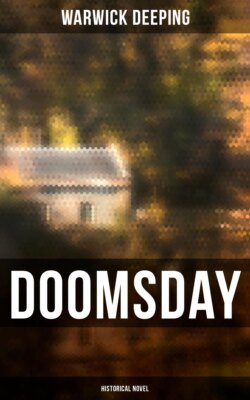Читать книгу Doomsday (Historical Novel) - Warwick Deeping - Страница 30
На сайте Литреса книга снята с продажи.
3
ОглавлениеAt Great Park Farm, Melhurst, country carts, cars, Fords, and a light lorry or two were parked in the paddock, while their owners went in search of bargains; and Furze, who had kept his greys under the shade of a big chestnut tree and in the charge of a friendly carter, wandered about catalogue in hand. Great Park spread itself in the arms of a pleasant and untidy old garden full of monkshood and lilac and guelder rose, and since the weather was fair much of the gear to be sold had been laid out in the garden.
Furze, pencil in hand, marked the lots upon the catalogue for which he wished to bid. Harnett the auctioneer had gathered in extraneous material, and it was a composite sale, and Great Park sheltered for the day much furniture that was strange to it. In the farm-house parlour, with its wallpaper of red roses and blue garlands, Furze found a massive old oak table with chamfered rails and square legs, black-brown with age, put together by some village carpenter a hundred and fifty years ago. On the table was laid out a pink lustre tea-service, six cups and saucers, teapot, sugar bowl and milk jug, and Furze, the lover, saw Mary's hands fluttering over the old china. He marked down the table, Lot 33, also the pink lustre tea-service, Lot 67. Wandering about the house with a crowd of farmers' wives and Melhurst women, and bargain hunters and snatchers up of the antique and the curious, he found many pieces fit for "Doomsday." His pencil left marks against an oak bureau, a mahogany chest of drawers, three old Windsor chairs, a bedstead, an oak chest, a long mirror in a faded gilt frame, a length of green cord stair carpet, a kitchen table, a deal cupboard, a set of knives, a willow pattern dinner service, a Chesterfield sofa that would need recovering. He jotted down against each item the amount that he could afford to bid for it. Particularly did he covet the old oak table and the pink lustre tea-service.
A dealer, old Symonds of Carslake, spoke to him in the kitchen. He knew Furze as an implacable bargain-hunter, a buyer of useful rubbish.
"Anything doing to-day, Mr. Furze?"
Old Symonds was a decent old boy, and Arnold confided to him his passion for the pink lustre.
"I suppose you fellows will be after it?"
Symonds screwed up his eyes.
"Not enough of it to be worth a scrimmage. Dare say I could get it for you."
"How much?"
"Can't say."
"Go to three pounds. My day's extravagance, Mr. Symonds."
Harnett held the sale in the garden, standing on a kitchen table under the shade of a lime tree, with a smaller table to serve as a rostrum. He was a bald-headed, cynical man, with a set smile, and a tired, flat voice. His gagging was conventional and perfunctory. "Thirteen shillings I am bid. Thirteen shillings! Unlucky number, ladies and gents. Make it fourteen. Thank you, Mr. Brown. Fourteen shillings I am bid, good kitchen table. Fifteen shillings, Mr. Furze. Fifteen shillings—"
It was a hot day, and the bidding was languid, and the crowd one such as Mr. Harnett was apt to describe as a "Lot of gaping stock-fish." Arnold was lucky. Mr. Symonds bought in the tea-service for one pound, fifteen shillings. Furze lost the oak bureau, but he won the table, the mahogany chest of drawers, the Windsor chairs, the bedstead, the oak chest, the long mirror, the stair carpet, the kitchen table and half a dozen other bargains.
With the help of a gentleman from Melhurst who was there to earn some casual silver as a porter Furze loaded his possessions on to the wagon, covered them with a rick cloth, and started for "Doomsday." His lunch had been a slice of bread and a piece of cheese, and some cold tea out of a bottle, but it was one of those days for him when a man does not feel physical hunger. He was happy. He walked beside his two "greys" with a mind full of possessive symbolism. The rose lustre tea-service, carefully packed in a box, was the cynosure of the day's happenings. Already he was making plans for the disposal of the furniture.
It happened that from the bank above the road Mary Viner saw the blue wagon pass as she had seen it set off in the morning. But much had happened. The wagon was full, but her heart felt empty.
Furze saw her and pulled up for a moment, and his face was happy. Her conscience smote her.
"I have done rather well."
She smiled down at the lover in him, because she loved the lover.
"I'm so glad."
"You must come and have tea, you and your people, when I am straight."
"We should love to."
He waved his hat and went on, leaving her to wonder why the lover should not suffice, and why he should be lost in the husband. For that is what happened; she had read it and been told it. Marriage was a wholly different affair. "My dear, flirt with the bank-clerk if you like—but marry the banker." Clare's philosophy. Marriage should be comfortable; it needed cushions. Lovers might be content with a haycock or a bank of heather, and an ephemeral moonlight madness; marriage was a house to be lived in.
She returned to her "Green Shutters" and her old people, and the making of a gooseberry tart. Gooseberries were early that year.
